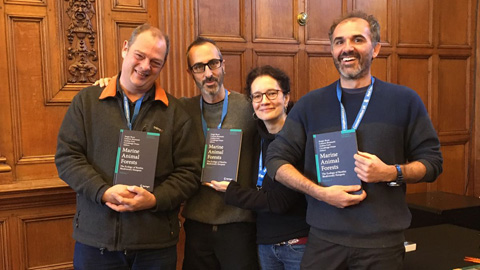Scientists alert of swift degradation of marine ecosystems and grave consequences for the planet

20/12/2017
Researchers from the Institute for Environmental Science and Technology at the Universitat Autònoma de Barcelona (ICTA-UAB), the University of Barcelona, the French National Centre for Scientific Research (CNRS) and the Spanish Institute for Oceanography (IEO) alert about the progressive deterioration of marine ecosystems and the serious consequences this can have in conserving the planet from today's global climate change.
A book edited by Sergio Rossi from the ICTA-UAB, with Andrea Gori (Faculty of Biology, UB), Lorenzo Bramanti (CNRS), and Covadonga Orejas (IEO) manifests that in the past 20-30 years human actions have caused dramatic and highly accelerated changes in marine ecosystems, and altering their natural ability to absorb the growing amounts of CO2 found in the atmosphere. The book "Marine Animal Forest", published by Springer Nature, provides a broad view on deep sea ecosystems around the planet, populated by animals anchored to the seafloor, and addresses the fairly unknown subject of "marine animal forests".
This terminology refers to the communities living at the bottom of the ocean (benthic communities) and dominated by corals, gorgonians, sponges and (immobile) bivalves which form highly complex three-dimensional structures which in turn serve as home to many other species. "These communities are similar to land forests in structure and function although they are made up mainly of animals instead of plants", explains Sergio Rossi. As in forest ecology, the concept aims to provide a common framework for a type of system which functions based on a common strategy: filtering water particles, "which is why they are called benthic suspension feeders which feed off of suspended material" Rossi highlights. The ICTA-UAB researcher emphasises that the "marine animal forest" or "animal forest" is probably the most extensive structure on the planet, given that 70% of the planet's surface is covered by seas and oceans, and contains 90% of life on Earth. Nevertheless, "the unexplored parts of this animal forest is enormous" and this indicates that "we only know about 5% of what lies at the bottom of the ocean, from a biological and community viewpoint, which is very little when compared to our knowledge of land surface".
According to Andrea Gori (UB), "this new volume is the result of the contributions of researchers who study several organisms from different perspectives, and who for the first time coincide in a publication on the general concept of animal forests which demonstrates their important ecological role as structural species of marine ecosystems".
Researchers also mention that the effects of human activities are producing a dramatic loss in biomass and biodiversity, as well as a lower recovery capacity. The importance of animal forests not only resides in the fact that they provide ecosystem services such as food, protection and refuge for marine fauna, but also that they play a fundamental role in the hydrodynamic and biogeochemical cycles of the seabed, acting as a sink for the carbon emitted by humans into the environment. "The role of forests as carbon sinks is essential, but this has not been taken into account in conservation models and no one has calculated how much carbon could be absorbed. This data simply does not exist", Rossi remarks". The main problem lies in that many of these animal forests are made up of longevous animals which can take hundreds of years to grow, as happens with surface trees. When they are destroyed by deep sea trawling or mining for example, the corals, sponges and gorgonians can take a very long time to recover.
For humans, marine animal forests provides services such as fishing, precious corals and species to be used for pharmaceutical and medical purposes, construction materials or souvenirs to be sold to tourists, and their systematic disappearance has repercussions on the economy. All of these services are threatened by human impact and global climate change. In addition to destructive and excessive fishing practices, contamination, uncontrolled aquaculture, oil and gas exploitation, and coastal development, the effects of global climate change must be taken into account, such as global warming, water acidification, a rise in sea levels, icebergs melting and the increase in frequency and intensity of hurricanes. "All this will lead to the degradation of biodiversity, the destruction of complex ecosystem structures and the loss of ecosystem services", Rossi warns.
The book unites the joint experience and knowledge of a large number of marine scientists involved in the exploration, research and conservation of marine communities, offers a detailed description of marine animal forests and analyses the effects of anthropogenic impacts. An example is the in-depth study of gorgonians which, due to their nature, are replacing corals which disappear from areas such as the Caribbean. "They are more flexible to changes and adapt better, but they store less carbon and their structures do not form reefs such as the hard corals, nor are they more resistant to hurricanes", Rossi says as he also highlights that "99% of the energy of waves reaching the coastline during a hurricane is absorbed by coral reefs. The disappearance of these reefs and other complex and longevous biogenic structures only accelerates the degradation process occurring across the planet, which is transitioning towards more simplified and opportunistic systems".
For this reason, scientists send out a common warning about these ecosystems. "If we do not take precautions, the most complex and biodiverse ecosystems may disappear in a few decades, as are many of the phanerogam forests and longevous marine algae disappearing now due to direct and indirect human actions".
Original article:
Rossi S., Bramanti L., Gori A., Orejas C. (Eds.).Marine Animal Forests. The Ecology of Benthic Biodiversity Hotspots. 2017. 1366. ISBN: 978-3-319-21013-1
http://www.springer.com/us/book/9783319210117